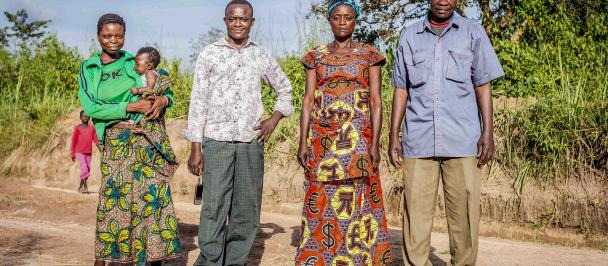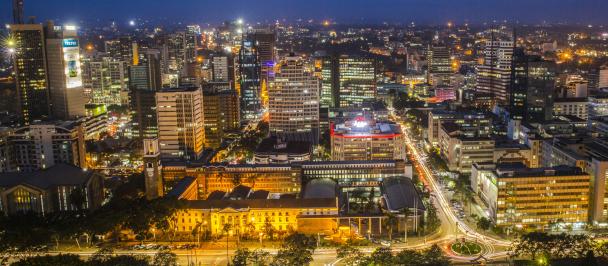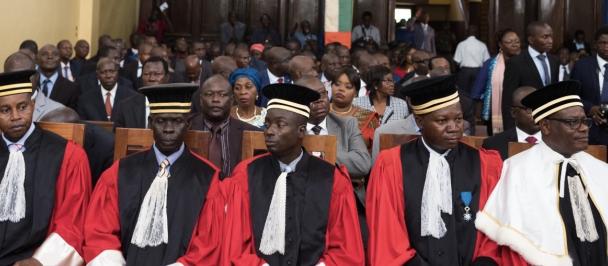Your Excellencies, Ladies and Gentlemen,
On behalf of UNDP, I wish to extend our sincere gratitude for inviting UNDP to be part of this important forum for Migration and Development.
I would like to recognize the excellent achievements of two-year mandate of Co-Chairs of the GFMD, Your Excellencies, Ambassador Götz Schmidt-Bremme and Secretary General Mr. El Habib Nadir. You started your co-chairmanship with a clear vision and thrust of contributing to the adoption of the Global Compact for Migration, as well as recommendations for the 2030 Agenda for Sustainable Development. Throughout your mandate, you have steadfastly led the international community in working together towards these goals.
The 360 degrees vision of the Global Compact for Migration and the Sustainable Development Goals is an excellent framework for development actors to contribute in migration governance in support of the GFMD
Ladies and Gentlemen,
This Summit with its theme: Honouring International Commitments to Unlock the Potential of All Migrants for Development, has come at a momentous time for us all to rally behind the implementation of the Global Compact for Migration.
UNDP has long been supporting countries of origin, transit and destination in various contexts without even calling it a ‘migration issue’. Issues now identified as the drivers of migration, such as poverty and economic opportunities, poor governance, climate change and environmental degradation, and conflict have always been at the heart of UNDP’s mission. However, the Global Compact for Migration will bring us to the next stage in dealing with migration. It has brought new lenses to work even more closely with migrants, refugees, internally displaced persons and vulnerable host communities.
Working together with partners, UNDP intends to attach specific focus on its support to member states’ implementation of the GCM on the following:
Objective 1 – on Addressing the drivers and structural factors that force people to move;
Objective 19 – on Contribution of migration to sustainable development, and;
Objective 21 – on Enabling sustainable reintegration.
Most of our policy and programme support to countries are already addressing the above objectives and key commitments under them. For instance, we have been working with IOM for the last 7 years to support 8 countries in mainstreaming migration into local and development plans. We plan to continue working together to better measure and make more visible human development impacts of migration in our programme countries.
Let me cite an example. In Moldova, as you may know, about 80,000 children have at least one parent working abroad. With the help of Moldovan diaspora abroad, UNDP and the Moldovan government are piloting an initiative to boost local entrepreneurship and to create sustainable livelihoods in the country’s emerging tourism sector. We are also working with local authorities on service delivery. To date, over 200,000 people have benefited directly and indirectly from better services as a result of migrants/diasporas’ substantive participation in local planning processes and their financial contributions to poverty reduction and sustainable development programmes. This initiative addresses the three dimensions of our focused interventions; namely change adverse drivers of migration to contributions of migrants to sustainable development, and create an enabling environment for sustainable return to Moldova.
Let me cite another example. In Niger, UNDP is working together with national institutions and local NGOs to support the resilience of communities, particularly youths and women-headed households. We are strengthening our work around Lake Chad Basin to prevent and mitigate the negative impact of current insecurity, including through improving core government functions, justice and rule of law, supporting livelihoods diversification, and community early warning mechanisms. Support is also provided to inter/intra community social cohesion and dialogue for peaceful coexistence at local level.
Such initiatives are happening in many other countries. We hope to build on these interventions and use the experiences and lessons that we are learning during the implementation of the Global Compact for Migration and in our collaboration with the GFMD, our UN partners, the World Bank and civil society and all others.
Ladies and Gentlemen,
The era of SDGs and Agenda 2030 brought us a new dimension in our pursuit of international cooperation and partnerships. Supporting and accelerating progress in SDG implementation through integrated approaches has become critical. UNDP is currently helping Governments to identify priorities, accelerators and develop plans for achieving national SDGs through a tool called Mainstreaming Acceleration and Policy Support (MAPS). For instance, in Jamaica, diaspora investments and remittances were identified as key accelerators for the SDGs. In Sudan and Ukraine, addressing forced migration/displacement issues and leaving no-one behind were highlighted in the SDG acceleration plans.
It is our belief that UNDP’s integrator mandate serves both as a foundation for a strong and coherent UN development system, and as a key provider of integrated services and platforms to the achievement of the SDGs. Working with our partners, UNDP wishes to seize this opportunity to ensure that migration is a priority when we support countries to localize SDGs. We intend to play an active role in the newly-established UN Network on Migration.
Ladies and gentlemen,
UNDP thus looks forward to a strengthened partnership with the Global Forum on Migration and Development under Ecuadorian chairmanship in 2019. UNDP is committed to continuing working closely together with our partners to support member states in the Global Compact Migration implementation, which is rightly anchored in the 2030 Agenda for Sustainable Development.
Thank you.

 Locations
Locations























